Unit 8 Culture Shapes Us Lesson 45 Different Manners 课件(共27张PPT) 冀教版九年级英语全册
文档属性
| 名称 | Unit 8 Culture Shapes Us Lesson 45 Different Manners 课件(共27张PPT) 冀教版九年级英语全册 | 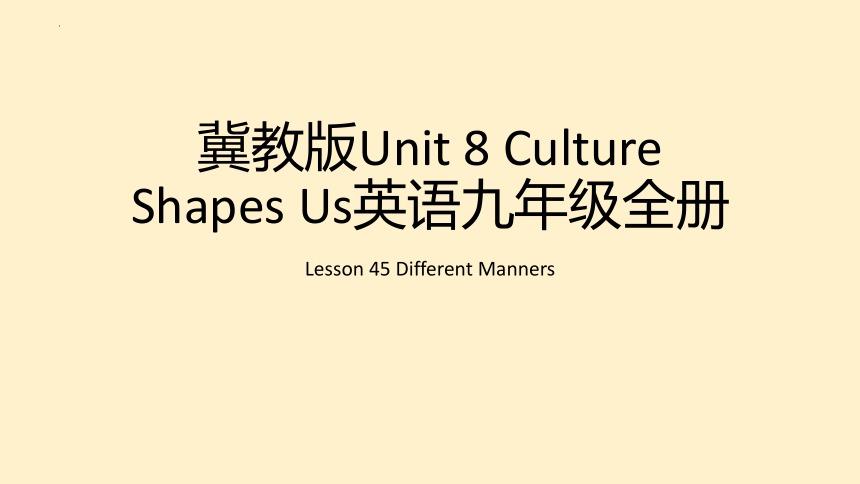 | |
| 格式 | pptx | ||
| 文件大小 | 7.2MB | ||
| 资源类型 | 教案 | ||
| 版本资源 | 冀教版 | ||
| 科目 | 英语 | ||
| 更新时间 | 2025-05-28 08:24:39 | ||
图片预览

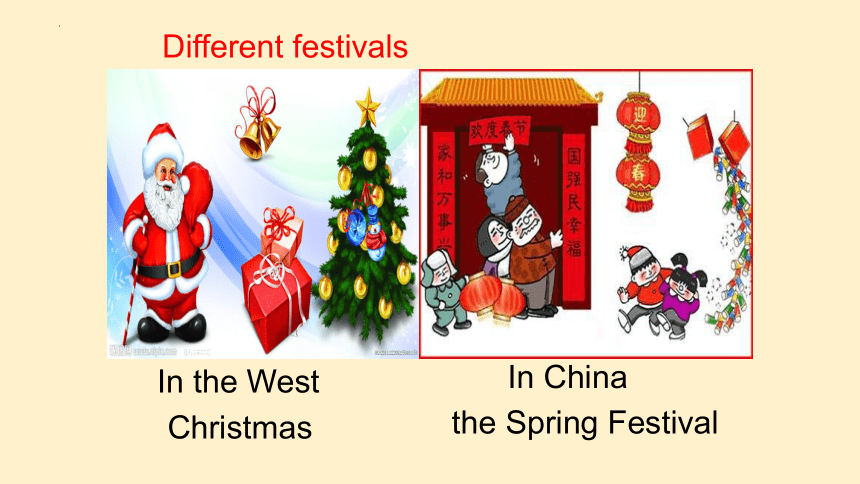
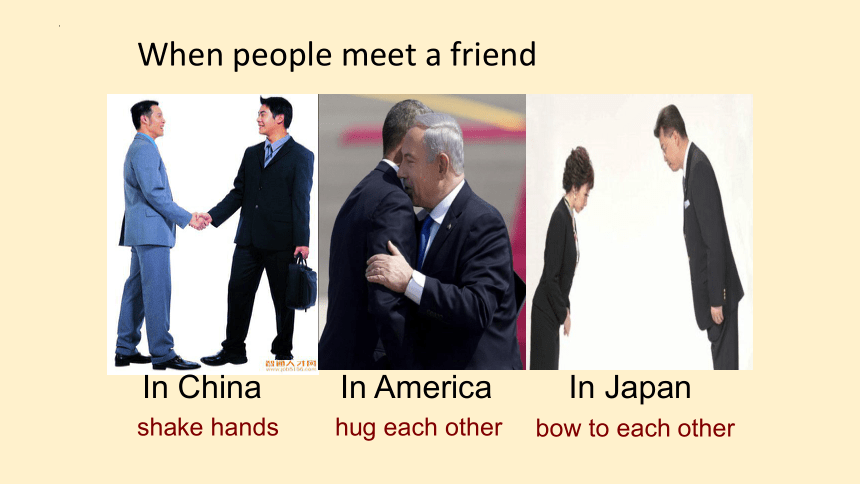
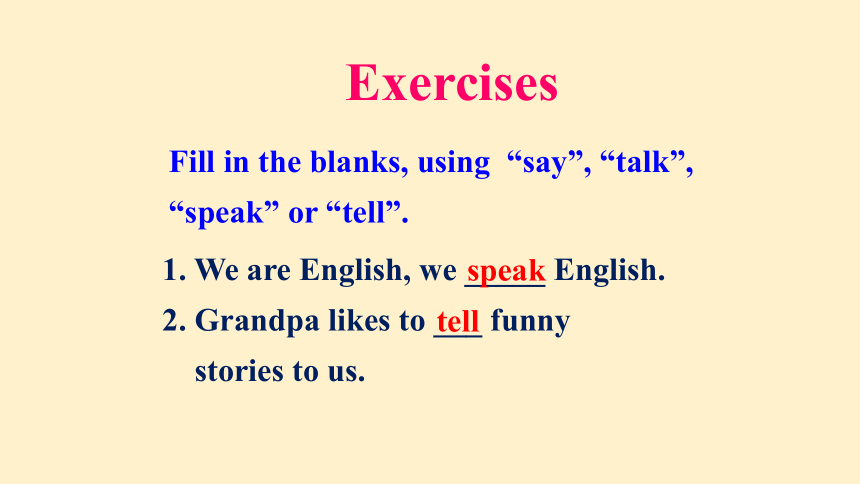
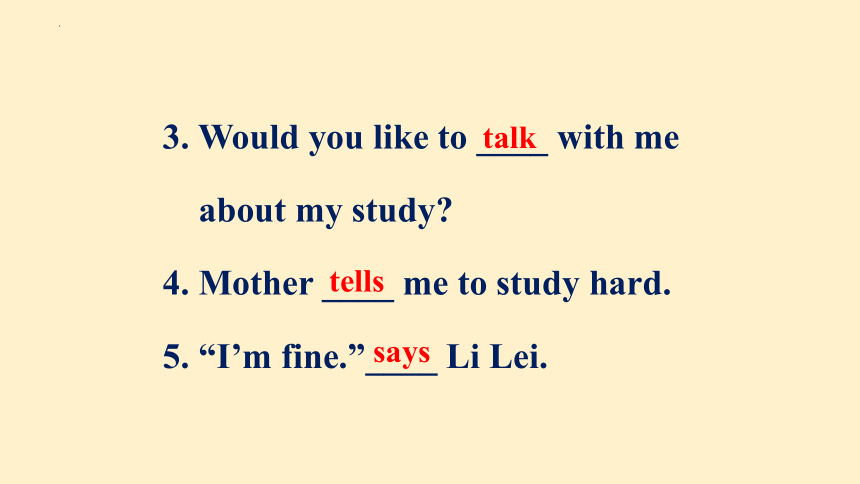
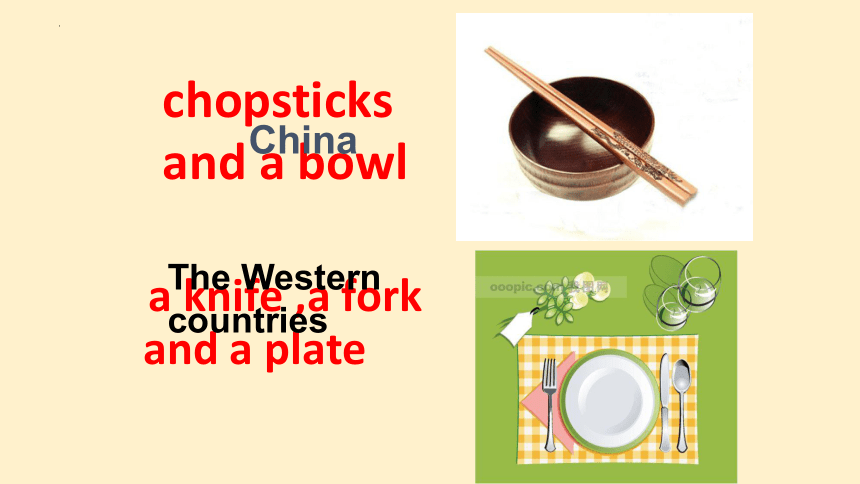
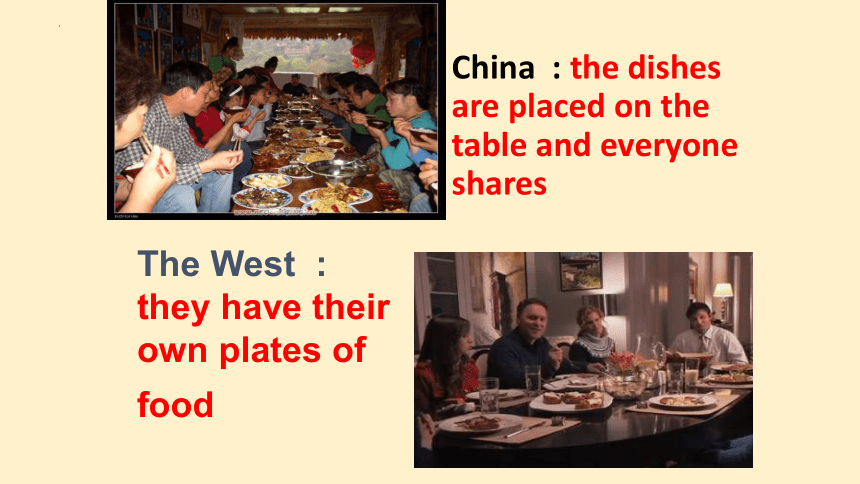
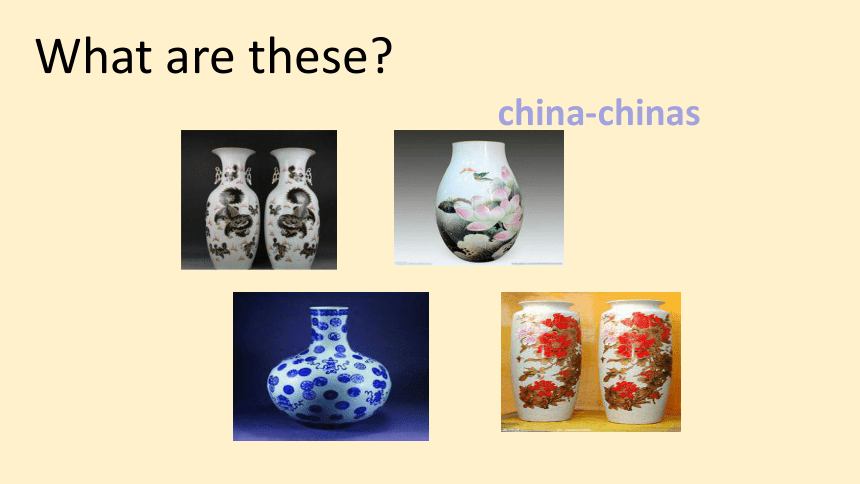
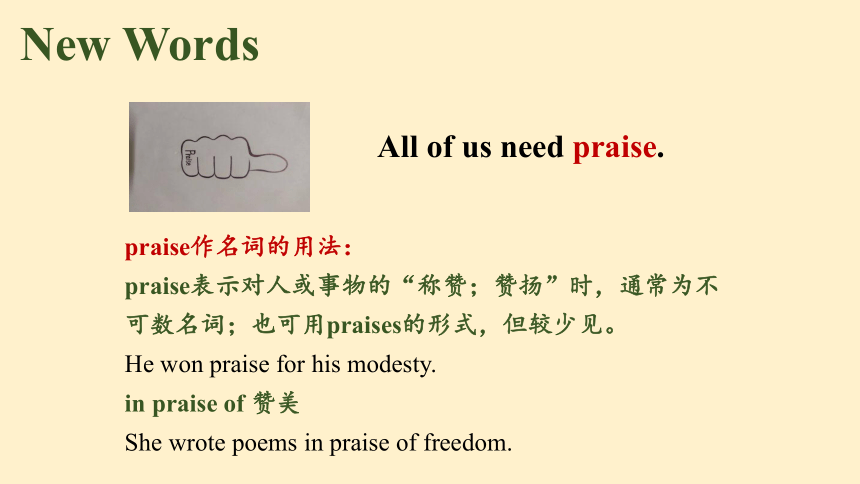
文档简介
(共27张PPT)
冀教版Unit 8 Culture Shapes Us英语九年级全册
Lesson 45 Different Manners
In China
In the West
Different festivals
Christmas
the Spring Festival
When people meet a friend
In China
In America
In Japan
shake hands
hug each other
bow to each other
1. We are English, we _____ English.
2. Grandpa likes to ___ funny
stories to us.
Fill in the blanks, using “say”, “talk”, “speak” or “tell”.
speak
tell
Exercises
3. Would you like to ____ with me
about my study
4. Mother ____ me to study hard.
5. “I’m fine.”____ Li Lei.
talk
tells
says
chopsticks and a bowl
a knife ,a fork and a plate
China
The Western countries
China : the dishes are placed on the table and everyone shares
The West : they have their own plates of food
What are these
china-chinas
New Words
All of us need praise.
praise作名词的用法:
praise表示对人或事物的“称赞;赞扬”时,通常为不可数名词;也可用praises的形式,但较少见。
He won praise for his modesty.
in praise of 赞美
She wrote poems in praise of freedom.
China :
Chinese hosts like to put food into the plates of their guests
The West :
the guests enjoy the food by themselves
hosts
guests
guests
hosts
The teacher praised her for her courage.
praise作动词的用法:
praise+n./pron.称赞……
They have been praising you all the time.
praise sb. for sth.因某事赞扬某人
He praised her for her courage.
New Words
了解不同国家不同的风俗习惯
When people meet a friend
In China
In America
In Japan
shake hands
hug each other
bow to each other
My name is Wu Zhou, I have lived in Canada for twenty-three years. In Canada, I call myself Joe Wu. Joe is an English name that sounds like Zhou.
Though I have lived here for a long time, I still don’t feel Canadian. This is probably because North American manners and Chinese manners are so different.
In China, being modest is a virtue, If someone praises you and says that your English is excellent, you should be modest and say, “No, no. My English is still poor.”
I have many good friends in Canada, though Canadian culture is different from Chinese culture.
In China
In the West
When people have a meal
virtue ['v :t u:]
n. 美德;德行;价值
the elderly 老年人
elderly ['eld li]
adj. 上了年纪的; 较老的 n. 老人
e.g. The film is about an elderly woman.
电影讲述的是一位老太太的故事。
e.g. His virtue is patience.
耐心是他的美德。
In China
In the West
Different festivals
Christmas
the Spring Festival
extra [ ekstr ]
adj. 额外的 n. 附加物
e.g. The meeting is going to be a lot of extra work.
这次会议将意味着很多额外工作。
waitress n. 女服务员
e.g. Waiter, could you bring me some water
服务员,给我送点儿水来好吗?
waiter [ we t (r)]
n. 服务员;侍者
My name is Wu Zhou, I have lived in Canada for twenty-three years. In Canada, I call myself Joe Wu. Joe is an English name that sounds like Zhou.
Though I have lived here for a long time, I still don’t feel Canadian. This is probably because North American manners and Chinese manners are so different.
In China, being modest is a virtue, If someone praises you and says that your English is excellent, you should be modest and say, “No, no. My English is still poor.”
I have many good friends in Canada, though Canadian culture is different from Chinese culture.
But in North America, this is usually a sign of being weak and not confident. You should just say, “Thank you.”
In Canada, people only ask children about their age. It’s not polite to ask an adult’s age. They think it is private. But this is common in many places in China.
In both China and North America, it is polite to offer an elderly person a seat on the bus. In North America, however, an elderly person may feel embarrassed about being offered a seat.
重点探究
In your opinion, what are you good manners
Do you think cultures shape manners
Is it a good manner
Why do you think so
1. When Chinese people eat out in restaurants, they may take turns paying for the meal.
eat out
出去吃饭
take turns
轮流
take turns (in) doing sth.
轮流做某事
= take turns to do sth.
pay for
(为...)支付
2. It is called “tipping”.
tip [t p]
v. 给小费
tip
n. 提示;指点
tip on/for sth.
...的提示
1. Read the lesson and match the behaviours with the correct countries.
China
Canada
asking an adult’s age
putting food on a guest’ s plate
giving a tip to waiters and hotel workers
sharing the cost of a meal in a restaurant
Let's Do It!
But in North America, this is usually a sign of being weak and not confident. You should just say, “thank you.”
In Canada, people only ask children about their age. It’s not polite to ask an adult’s age. They think it is private. But this is common in many places in China.
In both China and North America, it is polite to offer an elderly person a seat on the bus. In North America, however, an elderly person may feel embarrassed about being offered a seat.
1. Her voices weet and it a bird.
A. sounds; sounds like B. sound; sound like
C. sounds like; sounds D. sound like; sound
2.—Your dress looks nice. How much did you it
—Two thousand yuan.
A. blow away B.pay for
C. deal with D. focus on
选一选
A
B
3. It's not polite at others with chopsticks while you are having meals.
A. pointing B. to point C. points D. point
4.My foreign friend knows a lot about China she has never been there.
A.although B.if C.because D.until.
5. It was that the boy was able to solve the problem so quickly.
A.embarrassing B.amazing C.interesting D. relaxing
B
A
B
Bye-bye
冀教版Unit 8 Culture Shapes Us英语九年级全册
Lesson 45 Different Manners
In China
In the West
Different festivals
Christmas
the Spring Festival
When people meet a friend
In China
In America
In Japan
shake hands
hug each other
bow to each other
1. We are English, we _____ English.
2. Grandpa likes to ___ funny
stories to us.
Fill in the blanks, using “say”, “talk”, “speak” or “tell”.
speak
tell
Exercises
3. Would you like to ____ with me
about my study
4. Mother ____ me to study hard.
5. “I’m fine.”____ Li Lei.
talk
tells
says
chopsticks and a bowl
a knife ,a fork and a plate
China
The Western countries
China : the dishes are placed on the table and everyone shares
The West : they have their own plates of food
What are these
china-chinas
New Words
All of us need praise.
praise作名词的用法:
praise表示对人或事物的“称赞;赞扬”时,通常为不可数名词;也可用praises的形式,但较少见。
He won praise for his modesty.
in praise of 赞美
She wrote poems in praise of freedom.
China :
Chinese hosts like to put food into the plates of their guests
The West :
the guests enjoy the food by themselves
hosts
guests
guests
hosts
The teacher praised her for her courage.
praise作动词的用法:
praise+n./pron.称赞……
They have been praising you all the time.
praise sb. for sth.因某事赞扬某人
He praised her for her courage.
New Words
了解不同国家不同的风俗习惯
When people meet a friend
In China
In America
In Japan
shake hands
hug each other
bow to each other
My name is Wu Zhou, I have lived in Canada for twenty-three years. In Canada, I call myself Joe Wu. Joe is an English name that sounds like Zhou.
Though I have lived here for a long time, I still don’t feel Canadian. This is probably because North American manners and Chinese manners are so different.
In China, being modest is a virtue, If someone praises you and says that your English is excellent, you should be modest and say, “No, no. My English is still poor.”
I have many good friends in Canada, though Canadian culture is different from Chinese culture.
In China
In the West
When people have a meal
virtue ['v :t u:]
n. 美德;德行;价值
the elderly 老年人
elderly ['eld li]
adj. 上了年纪的; 较老的 n. 老人
e.g. The film is about an elderly woman.
电影讲述的是一位老太太的故事。
e.g. His virtue is patience.
耐心是他的美德。
In China
In the West
Different festivals
Christmas
the Spring Festival
extra [ ekstr ]
adj. 额外的 n. 附加物
e.g. The meeting is going to be a lot of extra work.
这次会议将意味着很多额外工作。
waitress n. 女服务员
e.g. Waiter, could you bring me some water
服务员,给我送点儿水来好吗?
waiter [ we t (r)]
n. 服务员;侍者
My name is Wu Zhou, I have lived in Canada for twenty-three years. In Canada, I call myself Joe Wu. Joe is an English name that sounds like Zhou.
Though I have lived here for a long time, I still don’t feel Canadian. This is probably because North American manners and Chinese manners are so different.
In China, being modest is a virtue, If someone praises you and says that your English is excellent, you should be modest and say, “No, no. My English is still poor.”
I have many good friends in Canada, though Canadian culture is different from Chinese culture.
But in North America, this is usually a sign of being weak and not confident. You should just say, “Thank you.”
In Canada, people only ask children about their age. It’s not polite to ask an adult’s age. They think it is private. But this is common in many places in China.
In both China and North America, it is polite to offer an elderly person a seat on the bus. In North America, however, an elderly person may feel embarrassed about being offered a seat.
重点探究
In your opinion, what are you good manners
Do you think cultures shape manners
Is it a good manner
Why do you think so
1. When Chinese people eat out in restaurants, they may take turns paying for the meal.
eat out
出去吃饭
take turns
轮流
take turns (in) doing sth.
轮流做某事
= take turns to do sth.
pay for
(为...)支付
2. It is called “tipping”.
tip [t p]
v. 给小费
tip
n. 提示;指点
tip on/for sth.
...的提示
1. Read the lesson and match the behaviours with the correct countries.
China
Canada
asking an adult’s age
putting food on a guest’ s plate
giving a tip to waiters and hotel workers
sharing the cost of a meal in a restaurant
Let's Do It!
But in North America, this is usually a sign of being weak and not confident. You should just say, “thank you.”
In Canada, people only ask children about their age. It’s not polite to ask an adult’s age. They think it is private. But this is common in many places in China.
In both China and North America, it is polite to offer an elderly person a seat on the bus. In North America, however, an elderly person may feel embarrassed about being offered a seat.
1. Her voices weet and it a bird.
A. sounds; sounds like B. sound; sound like
C. sounds like; sounds D. sound like; sound
2.—Your dress looks nice. How much did you it
—Two thousand yuan.
A. blow away B.pay for
C. deal with D. focus on
选一选
A
B
3. It's not polite at others with chopsticks while you are having meals.
A. pointing B. to point C. points D. point
4.My foreign friend knows a lot about China she has never been there.
A.although B.if C.because D.until.
5. It was that the boy was able to solve the problem so quickly.
A.embarrassing B.amazing C.interesting D. relaxing
B
A
B
Bye-bye
同课章节目录
- Unit 7 Work for Peace
- Lesson 37 Don't Fight!
- Lesson 38 Making School a Better Place
- Lesson 39 The Dove and the Olive Branch
- Lesson 40 The UN—Power of Words
- Lesson 41 Jenny's Good Advice
- Lesson 42 Peace at Last
- Unit Review
- Unit 8 Culture Shapes Us
- Lesson 43 A Visit to Chinatown
- Lesson 44 Popular Sayings
- Lesson 45 Different Manners
- Lesson 46 Home to Many Cultures
- Lesson 47 Good Manners
- Lesson 48 Supper with the Bradshaws
- Unit Review
- Unit 9 Communication
- Lesson 49 Get Along with Others
- Lesson 50 Tips for Good Communication
- Lesson 51 What Could Be Wrong?
- Lesson 52 The Power of a Smile
- Lesson 53 Working in Groups
- Lesson 54 How Embarrassing!
- Unit Review
- Unit 10 Get Ready for the Future
- Lesson 55 Look into the Future
- Lesson 56 Manage Your Time
- Lesson 57 Best Wishes
- Lesson 58 Ms.Liu's Speech
- Lesson 59 Keep Your Choices Open
- Lesson 60 Get a Good Education
- Unit Review
